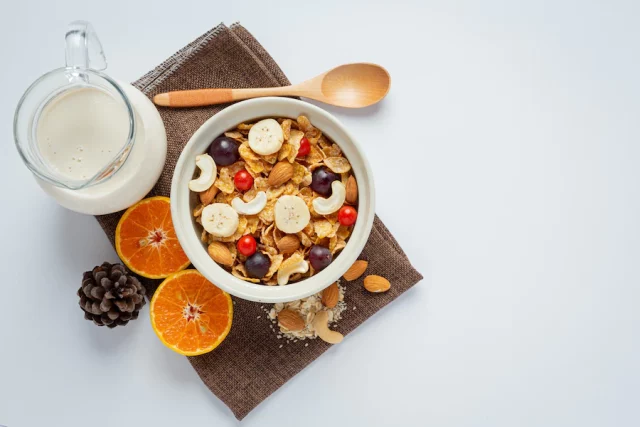
Breakfast. Research shows that many of us believe that it’s the most important meal of the day—and there is plenty of science to support it. Still, more than half of us do not eat breakfast everyday. Learn about the long-standing and latest reasons to enjoy the morning meal.
Breakfast Fuels Your Empty Tank
Do you bypass breakfast to save time in the morning? This tactic often backfires, because running on empty can leave you feeling fatigued and out-of-sorts— not on top of your game like you need to be. So, stoke your energy engine! Break for breakfast—it takes just a few minutes to fuel up.
Breakfast Boosts Brain Power
How totally cool that breakfast fuels kids’ brains for school! Several studies suggest that eating breakfast may help children do better in school by improving memory, alertness, concentration, problem-solving ability, test scores, school attendance, and mood. Adult breakfast skippers, take a lesson—eating breakfast may help boost your brain power, too.
Breakfast is Just Plain Good for You
Breakfast-eating kids and adults get more fiber, calcium, vitamins A and C, riboflavin, zinc, and iron in their diets than breakfast-skippers. It’s no wonder when you consider that nutrient rich foods such as whole-grain hot and ready-to eat cereals, fat-free and low-fat milk and yogurt, and fruit and 100 percent fruit juice are popular breakfast picks. The first meal of the day keep can help weight gain away, so don’t skip breakfast to manage your weight. Research suggests that adult breakfast skippers are at greater risk for obesity and weight gain, while breakfast eaters tend to have healthier weights. Kids and teens who eat breakfast are less likely to be overweight, too. And, according to findings from the National Weight Control Registry, almost eight in 10 adults who maintain a 30-plus pound weight loss for at least a year eat breakfast every day. Why the breakfast benefit? Research shows a link between healthier body weights and eating foods such as hot and ready-to-eat cereal and fat-free or low-fat milk and milk products. Breakfast foods like oatmeal and high protein milk products and eggs also may help you feel full.
Eating breakfast may help your heart, digestion, bones and more to meet dietary guidelines!
• A healthier heart – Adults and kids who skip breakfast tend to have higher blood cholesterol levels—a risk factor for heart disease—than do breakfast eaters. Why? Breakfast-eating adults tend to get less fat and more fiber in their diets. Kids and teens who eat breakfast get more fiber, too. Common breakfast foods may promote heart health. For instance, the soluble fiber in oatmeal may help reduce cholesterol and the whole grains and fiber in some cereals and breads may help reduce heart disease risk. Morning foods like fat-free or
low-fat milk and yogurt, fruit, 100 percent fruit juices, and whole grain cereals can be part of an eating plan that helps control blood pressure and educe LDL (bad) cholesterol levels.
• Better digestion – The insoluble fiber in many breakfast cereals and in other breakfast foods like whole-wheat breads, bagels and English muffins, and fruits, may help keep you regular. Some research suggests that fiber may reduce the risk of colon cancer. “Friendly” bacteria that may promote digestive health and the components that help them thrive are found in some yogurts, yogurt drinks and cereals.
• Stronger bones – A wholesome breakfast serves up nutrients important for healthy bones. For instance, milk—the most commonly-consumed breakfast food—provides calcium, vitamin D, and protein to name a few. Adults, teens, and kids who regularly eat breakfast consume more calcium and other nutrients each day. And people who start the day with the traditional cereal and milk combo get seven times more calcium at breakfast than those who eat cereal without milk.
• Improved metabolism – Newer, emerging research suggests that eating a nutritious breakfast of wholegrain cereal and milk may help the body better regulate insulin levels. Studies also suggest that popular breakfast foods such as whole-grain cereals and breads, milk products, and fruit may help reduce risk for metabolic syndrome. This condition is linked to being overweight and increases the risk for heart disease and type 2 diabetes.
Invest Time to Save Time
Invest in a little planning time to gain the
big benefits of breakfast.
• Sit down with the family to plan nutritious breakfasts for the week. Post the plan in plain sight in the kitchen. Getting kids involved encourages them to eat the morning meal.
• Add breakfast items to your shopping list so your kitchen is well-stocked.
• Each evening, set the table for breakfast and put out non-perishables such as cereal boxes, oatmeal containers, whole-grain bread, peanut butter, and fruit.
• Store milk, yogurt, hard-cooked eggs, 100 percent fruit juice and other perishable breakfast foods in the front of the fridge so they’re quick to grab.
• If the family is brown-bagging breakfast, pack and label each person’s bag the night before and store them in the fridge. Better yet, get everyone to assemble their own breakfast bag.
• On weekends, take time for a fun and healthful family breakfast to share the details of your busy week.